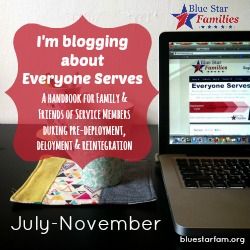 |
| We had family pictures made last week before Jake's departure. Our photographer did an amazing job! |
It's deployment week for the Hicks Household, and let's just say it has been quite the roller-coaster. In fact, to the brave few who have dared to ask me how we're doing, that is exactly the term I used. But this week has also been a reminder to me that things come to us when we need them. Here's what I mean by that:
I spent time the past couple of days going through the Everyone Serves book to gain inspiration for this post. The book provides a series of worksheets to help families address a number of different issues related to deployment. The more practical ones ("to do" checklists, resources lists, etc.) were easy for me to go through. Being a type-A, highly organized, I spent most of my time going "yep, did that; and that; and that" and feeling pretty good about myself.
The ones having to do with "coping"--I steered clear of those. I thought "those are not for me this week." Turns out I was wrong about that.
I follow the Faith Deployed group on Facebook. It's a community of military and veterans' families trying to provide each other encouragement in facing the times apart from our soldiers. But most of the time, I "follow" the group like I follow anything else on Facebook: when it shows up in my feed, it gets my attention.
Monday was one of the days that Faith Deployed showed up in my feed. They posted a reprint of "A Tale of Two Deployments," an article by Sherry Mondragon about how her family handled two deployments very differently. Basically, the first one she tried to do all on her own, and her husband came home to a frazzled, chaotic family. After the second deployment, he came home to a happy, healthy family. The difference? She realized it really does take a village. As Sherry put it:
"Soldiers don’t serve or fight alone; they are part of a unit and have battle buddies for help and accountability. Those of us serving on the home front need battle buddies, too."
Sherry asked herself ‘what do I want my family to look like when he comes home?’ and then reached out for help in making her vision happen.
The first thing I thought about when I finished reading Sherry’s article was those worksheets I'd ignored. The ones on “coping.” The second thing I thought was, what does coping really mean? So I looked it up, and here’s what Dictionary.com had to say:
Coping
- Struggling or dealing, especially on fairly even terms or with some degree of success
- Facing and dealing with responsibilities, problems or difficulties, especially successfully or in a calm or adequate manner
Activate Your Village: Many of the suggestions centered on being proactive in engaging help. Reach out. Talk to people. Seek support. These things are really hard for me. Maybe it’s me afraid. Definitely, it’s me being private. My husband frequently tells me “You may have dozens of friends, but only a few every really know what’s going on in your head.” He’s right.
I always kind of feel like sharing my chaos with people would be an imposition. An inconvenience. And above all things I hate inconveniencing people. People have their own problems, they don’t need mine too.
The truth is that’s just me getting in my own way. Community is reciprocal. Maybe not in the moment, but we build families and friendships on mutual love and respect, and on helping each other. So it’s ok for me to be the one needing something sometimes.
I just need to keep repeating that to myself until it gets through my thick skull…
Take Care of the “We” AND the “Me”: I think as parents we tend to do a better job with the “we” part. We tend to be more willing to spend extra time and take extra care with our little people than we do with ourselves. But this is another thing that I have to frequently remind myself: when I’m not at my best, my son knows it.
When I’m refreshed and energized, he knows that too. And if I’m going to teach him to take care of himself, I’m going to have to lead by example. Even if it means taking an hour out here or there that I don’t think I have. It’s not selfish. It’s giving my family the best “me” possible.
Concentrate on the Things You Can Control: Wait, so does this mean I can’t control everything? I’m a control freak so I sure do try. The crazy irony is, the past two years have been really chaotic for us, even without the deployment, and yet I still try to control everything. When will I learn?
I think the problem is, it’s hard to admit ‘I can’t fix this. I can’t change this.’ Sometimes, it can really feel like giving up even though that’s a ridiculous conclusion to reach. I’m certainly guilty of it. If I can’t fix it, I must not be trying hard enough.
The problem is that trying to control everything often means doing a slipshod job of the things we actually can control. Like the way I spend time with my son. And how we maximize the opportunities to communicate with Jake. And how we fill the days while we are waiting for him to come home. Waiting is a reality, but it shouldn't be waiting to the exclusion of living. It should be living the best we possibly can with a piece of our hearts far away, so that wayward piece will return to a happy home.

We are happy to count ourselves amongst your village. We love you and will be with you as much (or as little) as you need us.
ReplyDelete